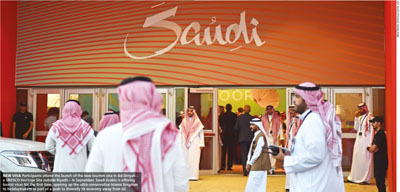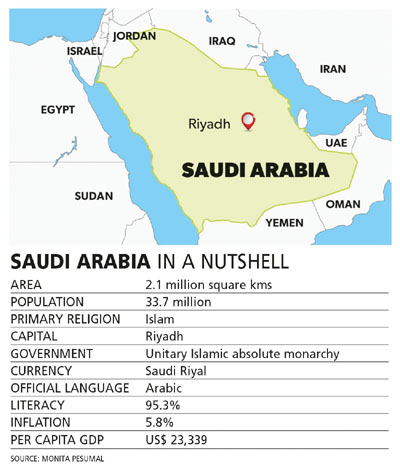SAUDI ARABIA TODAY
MOVING TOWARDS VISION 2030
Monita Pesumal highlights the economic achievements of the most powerful state in the Middle East

The Kingdom of Saudi Arabia (KSA) is the world’s 18th largest economy, a leading producer of oil and a founder member of OPEC. Saudi Arabia possesses around 17 percent of the world’s proven petroleum reserves. And its oil and gas sector accounts for around half of the kingdom’s GDP and some 70 percent of export earnings.
Apart from petroleum, KSA’s other natural resources include natural gas, iron ore, gold and copper.
On 1 December 2019, Saudi Arabia assumed the presidency of the G20 economic bloc and the recent virtual summit was a milestone for the kingdom, according to widespread media reports.
And on the official G20 website, a message from King Salman bin Abdulaziz proclaims: “On behalf of the people of the Kingdom of Saudi Arabia, it is my pleasure to welcome you as the kingdom assumes the 2020 G20 Presidency, and announce to the world our pursuit to create a cooperative environment for the G20 to introduce policies and initiatives that will fulfil the hopes of the people of the world.”
The message goes on to note that the kingdom is currently undergoing a historic transformation under ‘Saudi Vision 2030.’ In conclusion, it states that Saudi Arabia will work with G20 members to exchange experiences, solidify global cooperation and find solutions to the most pressing challenges of the 21st century around the world.
True to the king’s word in finding solutions to pressing challenges, the kingdom has contributed US$ 500 million to support international efforts and the WHO to fight the coronavirus, as well as help countries that need support.

Coronavirus cases are at a record low currently since the outbreak of the pandemic in Saudi Arabia. As of 21 December, the number of confirmed infections in the kingdom stood at slightly over 360,000 with in excess of 6,100 fatalities being recorded. When the pandemic took root, Saudi Arabia focussed on funding the healthcare sector including doubling the number of ICUs.
The size of Saudi Arabia’s fiscal stimulus is between 3.4 and 3.5 percent of GDP, which is well below the G20 average of nine percent, but the economy shrank by only 3.8 percent in 2020 – that’s less than the G20 average of 6.1 percent.
Saudi Arabia in the new millennium is a stark comparison to that of the last century. In this decade, the kingdom is lauded as the emerging hub of digital innovation and entrepreneurship in the Middle Eastern and North African (MENA) region. Saudi Arabia is MENA’s largest economy and Saudi consumers are among the top 20 highest spenders in the world.
In line with the kingdom’s Vision 2030, Saudi Arabia is shifting from the traditional dependency on oil towards innovation, digitisation and entrepreneurship.
Given the high internet and mobile phone penetration in KSA, businesses have access to a wealth of data and global trends. Over 70 percent of the population are active social media users – and the nation has one of the largest social media footprints on Earth. With over 40 million mobile subscribers, mobile penetration stands at 116 percent of the total population.
A new study also reveals that over two-thirds of Saudi Arabia’s population is under the age of 35 so culturally, the youth are becoming more welcoming and adaptive, which leads to more brilliant Saudi minds working to launch their own startups and become part of the digital economy.
Because of the youth population, the retail market in Saudi Arabia is among the fastest growing in the world. E-commerce presents the main opportunity as more consumers are shopping online and on their smartphones.
Under Saudi Vision 2030, the government aims to raise the contribution of SMEs to GDP from 20 percent to 35 percent in the next decade. The country is investing billions of dollars in technology and moving ahead with multiple economic reforms to strengthen the digital sector, to amplify and simplify doing business.
Saudi Arabia is also moving up in the ease of doing business ranking, according to the latest World Bank annual ratings. The country has made giant strides when it comes to starting a business, which has become easier as Saudi Arabia has established a one stop shop that merged several pre and post-registration procedures.
Acquiring construction permits, obtaining electricity and easier access to credit are some other areas where the kingdom has implemented key reforms, enabling more open trade and business.
Saudi Arabia is the only Gulf Cooperation Council (GCC) market where approximately 70 percent of the population is local. This means that when starting a business in the kingdom, catering to the needs of local consumers is a priority.
Moreover, Saudi Arabia is undergoing a promising tourism and cultural boom. There are plans to create more art galleries, museums, cinemas and entertainment hubs, to make the country more lucrative for tourists and attract 100 million tourists annually by 2030.
Indeed, this paves the way for new digital payment opportunities in the entertainment and tourism spaces.




